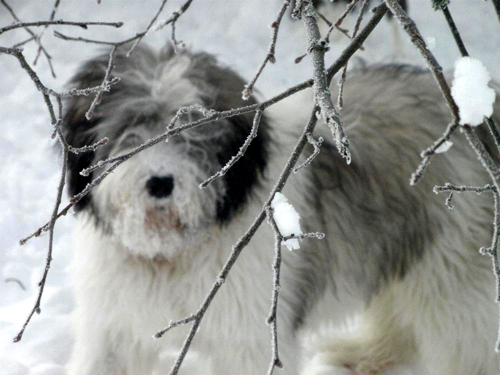| |
What to do if your PON has:
Itchy skin:
- Bathing - Try medicated baths recommended by your vet.
- Aloe Vera- Tear off a piece of the plant and apply the thick
juice directly to the raw area. Available locally at garden
centers.
- Aggravated skin sores, known as hot spots, can make
your PON miserable. If you see a hot spot developing, clip about
one-half to one inch around the sore to prevent hair and other
dirt from further aggravating it. Clean with hydrogen peroxide
on gauze or a cotton ball, and after it dries spray the area
with cortisone cream. Do this twice a day until the sore starts
to dry out or a scab begins to form.
- Consider a change of diet to a grain-free type of kibble.
- Change cleaning solutions.
Open wounds:
- Combine 1-pint water, 1/2-teaspoon salt, and 1/2-teaspoon
calendula tincture.
- Soak an injured paw in the solution. If the wound is on the
body put the solution in a quirt bottle or large syringe and
gently apply it to the injured area.
- Repeat the soaking or application every 4 to 6 hours for the
first 24 hours.
- Consult a vet if the open wound doesn't heal up within a few
days.
Bites and Scratches
- Rinse out the fresh wounds and punctures with large amounts
of this solution: 1-pint water, 1/2 teaspoon salt, and 1/2
teaspoon Echinacea/goldenseal tincture. These are available at
health food stores.
- Hydrogen peroxide may also be used to clean wounds, but it
can damage delicate tissues. Consult a vet if the bite/scratch
is deep.
Trauma
- If your PON falls, gets stepped on, is in a fight, or is
otherwise bruised, the homeopathic remedy arnica can speed
recovery. Give two pellets of arnica 30c once per hour for three
hours following the injury. Consult your vet.
Loose Stools
- The herb slippery elm, available as powder or capsules,
coats the lining of the gastrointestinal tract, counteracting
the irritation and allowing stools to firm up. Put 1 tablespoon
of the powder (break open capsules) into 1 pint of water and
bring to a boil to thicken. Let it cool, and administer by
mouth.
- Offer pure pumpkin found in the baking section of your local
supermarket.
Stickers in Fur
- Comb the stickers in their fur with a metal comb
immediately. If stickers are badly tangled rub vegetable oil on
your fingers and work the lubrication slowly through the fur
until you can pull the burrs out.
Itchy Ears
- Aloe Vera or the contents of a vitamin E capsule can soothe
red or inflamed areas of your PON's ear.
- A gentle cleaning with a cotton swab or gauze dipped into
vegetable oil can help to remove a buildup of wax and dirt.
- Remember that dog ear canals take a right-angle turn at the
base of the ear, and be careful not to jam anything deep into
the ear canal.
Arthritis
- Massage helps to relieve muscle tensions that contribute to
pain. Be gentle. Begin from the center of the body and work your
way outward. If feet are too sensitive, avoid massaging them.
- Nutritional research suggests that supplements containing
chondroitin sulfate and glucosaminoglycans, fish oil, New
Zealand Lippids, Icelandic sardine oil can help joints. Consult
your vet, health-food store and online sources.
- Regular exercise is important for joints.
- Weight management will help arthritis.
If a skunk sprays
- Bathe your PON in a mixture of 1-quart hydrogen peroxide,
1/4-cup baking soda, and 1 teaspoon liquid soap. Work the
solution into the fur (avoiding eyes) then rinse.
- To rid the stench from your PON douse him with tomato juice,
leaving it on for several minutes before rinsing it off.
You may need to repeat this.
When in doubt, please consult your vet.
Uh oh......flea problems ?
- Shampoo your PON with flea shampoo and spray between
shampoos with flea spray.
- Place a flea collar in the bag of your vacuum cleaner. Any fleas
you sweep up will stay put in there.
- If you don't want to use a flea collar with insecticides, active
ingredients such as eucalyptus, cedar, lemongrass, rosemary and
marigold won't exterminate, but will deter fleas.
- Placing an open jar or two of eucalyptus stems and leaves around
the house can deter fleas. Place them in rooms where your PON spends
the most time (especially those with carpets- fleas love to hide in
them.)
- Give your PON a flea bath with limonene shampoo, and flea-comb
him down thoroughly while he's in the water so the fleas drown.
- Try adding a teaspoon of vinegar to each quart of your PON's
drinking water. It helps keep dogs free of fleas and ticks.
- Sprinkle borate powder into crevices of couches and chairs.
- Stock your yard with off-leaf larvae-eating nematodes (available
at pet and garden stores).
- Proper nutrition for your PON is the best flea prevention. Add
brewer's yeast to your PON's food, as well as essential fatty acids
such as omega-3 and omega-6.
- Spray screens with distilled water containing several drops of
bitter orange essential oil. (Fleas hate citrus scent and will avoid
crawling in through the screens."
|
|

